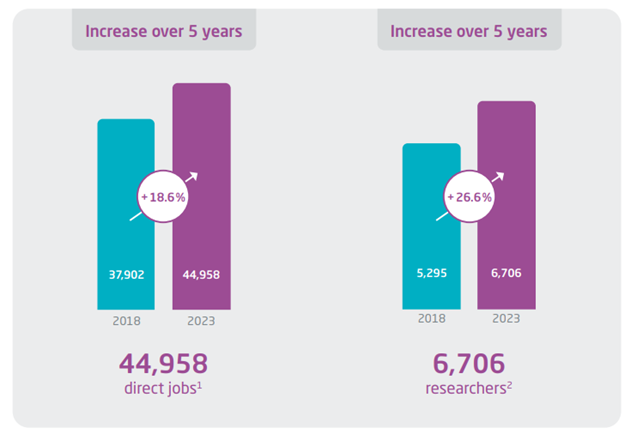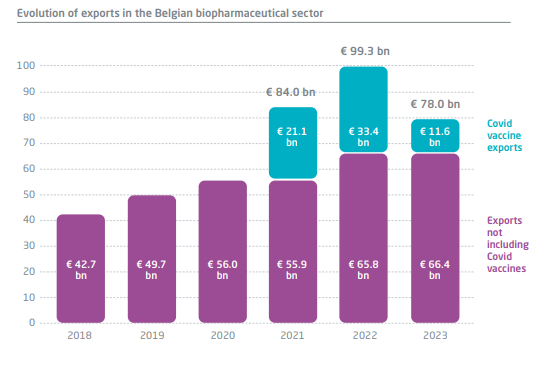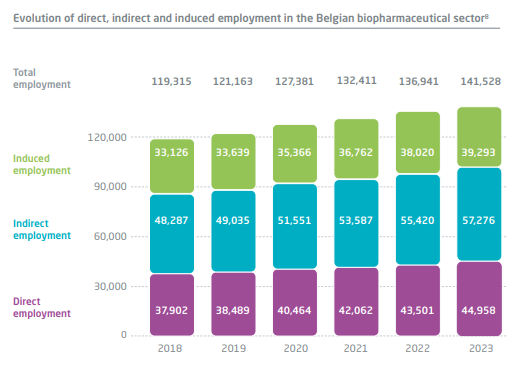The state of biopharma in Belgium: innovative strategies to overcome the talent shortage
The Belgian biopharmaceutical sector is an economic driver, achieving notable export growth, rising from 56 billion euros in 2020 to 85 billion euros in 2021, and then reaching 100 billion euros in 2022. In 2023, however, exports fell to 78 billion euros, mainly due to declining vaccine exports, but still remain 82.6% higher than the pre-Covid period. Currently, around 45,000 people work directly in Belgium's biopharmaceutical industry, an increase of 18.6% over five years.

The Belgian biopharmaceutical sector: an economic and social driver

Employment contribution
With more than 7,000 new jobs created in the past five years, the sector remains a significant source of employment. According to Pharma.be, it employs workers from various educational backgrounds, highlighting its inclusive nature.
Impressive growth despite challenges
Despite the recent decline, overall sector growth remains robust, underscoring its importance to the Belgian economy. The 82.6% increase compared to the pre-pandemic period highlights its ability to rebound and maintain international competitiveness.

The talent shortage in Belgian biopharma
Growing gap between supply and demand
However, despite these successes, the industry is threatened by a growing talent gap. The sector is expected to need 7,500 new employees in the next 3 to 5 years, or an average of at least 1,500 additional jobs per year. This increased demand for skilled talent is currently not being met by the influx of new graduates from relevant disciplines, creating a shortage of around 400 profiles per year, primarily in R&D, production, and areas related to digitalization.
Closing the talent gap: strategies and solutions
A multifaceted approach is essential to address this challenge, focused on strengthening local STEM (science, technology, engineering, and math) talent, attracting international expertise, and reskilling the current workforce. It is crucial to develop an ambitious STEM policy, increase training opportunities, and attract more international talent.
Strengthening local STEM talent
Enhancing local skills in STEM is essential. Collaboration between educational institutions and the biopharmaceutical sector must be intensified to align study programs with industry needs.
Attracting international talent
Simplifying work and residence permit procedures, as well as creating a "trusted employer" status, is necessary to attract international talent. Strengthening alumni networks and Belgium's presence in global educational institutions is also crucial.
Reskilling and upskilling the current workforce
Developing centralized platforms for lifelong learning, offering upskilling and reskilling opportunities, is vital. Digital and data science skills are increasingly in demand as the industry evolves. Integrating these skills into educational programs and workplace training would help workers remain competitive in the industry's evolution.
Conclusion: a call to action for Belgium's biopharmaceutical future
The Belgian biopharmaceutical sector is at a critical crossroads. Although the talent shortage represents a major challenge, it also provides an opportunity for innovation and growth. Rapid and coordinated action, combining improved local education, attracting international talent, and investing in lifelong learning, will enable the industry to overcome this challenge.
Why is the Belgian biopharmaceutical sector crucial to the national economy?
The Belgian biopharmaceutical sector is crucial as it significantly contributes to national exports and job creation.
How does the sector plan to close the growing talent gap?
Strategies include strengthening local STEM talent, attracting international talent, and upskilling the existing workforce.
Why is improving local STEM education essential?
Improving STEM education will provide more qualified local graduates to meet the sector's growing demand.
What skills are particularly in demand in the Belgian biopharmaceutical industry?
R&D, production, digitalization, and data science skills are the most sought-after.
What advantages would a "trusted employer" status provide?
The "trusted employer" status would facilitate hiring international talent by accelerating work permit procedures.
Why are digital skills becoming increasingly important?
The biopharmaceutical industry increasingly relies on data to improve processes, making data science essential for innovation and production.




